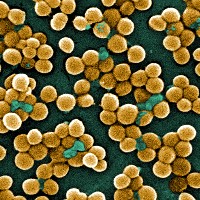
Scanning electron micrograph image of MRSA bacteria (Janice Haney Carr, Centers for Disease Control and Prevention)
Start up company ImmuVen in Champaign, Illinois agreed to license new technology and processes for treating methicillin-resistant Staphylococcus aureus (MRSA) from University of Illinois in Urbana-Champaign. ImmuVen was founded by the technology’s inventors, microbiologists David Kranz of the University of Illinois Urbana-Champaign and Patrick Schlievert of the University of Minnesota in Minneapolis.
MRSA is a type of staph bacteria that is resistant to certain antibiotics, and is still predominantly related to exposures to health care delivery. According to the U.S. Centers for Disease Control and Prevention, more than 94,000 people in the U.S. developed a serious MRSA infection in 2005. Some 18,650 persons died during a hospital stay related to these serious MRSA infections.
ImmuVen’s technology engineers T cell receptor proteins for treatments where conventional drugs have so far not been unsuccessful. T cell receptors are found on the surface of T cells, a major type of white blood cells that fights disease. T cells resemble antibodies in that they can recognize foreign antigens.
Unlike standard MRSA treatments, ImmuVen’s T cell receptor proteins target the toxins rather than destroying the invading bacteria. Once toxins are released into a person’s bloodstream, that person will remain sick even after the organism releasing the toxins is killed. To prevent the toxicity, ImmuVen engineered a T cell receptor protein that binds to and neutralizes the toxins.
Related: Drug Companies Urged to Conserve Antibiotics to Fight Resistance
* * *

 RSS - Posts
RSS - Posts
[…] This post was mentioned on Twitter by Alltop Science. Alltop Science said: Illinois Start Up Licenses Anti-Staph Infection Research http://bit.ly/gE410L Science.alltop […]
[…] Illinois Start Up Licenses Anti-Staph Infection Research […]
[…] Read more: Illinois Start Up Licenses Anti-Staph Infection Research […]